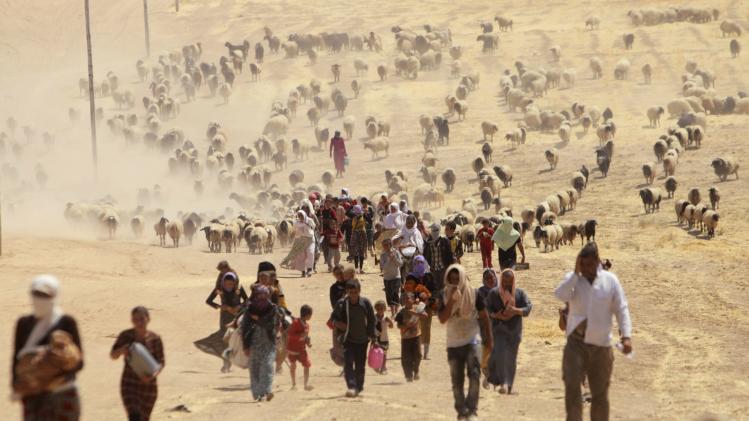A World of Refugees
"When Islamic State came over Sinjar, when they came to the neighbourhood of Solah the people started to run to the caves. Islamic State caught some and said they wouldn't kill them."
"But they put 60 people in a line and shot them one by one. They made a big hole with shovels and put them there."
"They killed my uncle. I saw his body -- that is why I came here. He was one of 48 bodies I saw in a mass grave They were all lying there."
Kerho Gaffal, Mount Sinjar, Iraq
"My family consists of nearly 85 members. I sent them all up the mountain, but all but five of them were taken by Islamic State."
Ali Razala, 67, Mount Sinjar, Iraq
Now that the Washington has committed to as-yet limited air strikes in support of the Kurdistan capital of Irbil and the Peshmerga battling the better-armed Islamic State, and losing ground to them resulting from their own lack of adequate weapons to match those of the jihadis, 15 targeted strikes are acknowledged to have slowed the advance of the militants while doing nothing to effective degrade their fighting force capabilities.
For that to happen the U.S. will have to commit to placing its military personnel on the ground, with instructions to scope out operations on the ground and direct air strikes to those areas where they will cause the most damage to Islamic State offensive positions.
And while U.S. intelligence agencies are now arming the Kurds directly rather than sitting back and allowing the Baghdad administration to trickle through to the Kurds arms supplied directly by the U.S. to the Iraqi military, those arms are of a limited nature, mostly light arms like AK-47s and ammunition, coming up against the more advanced U.S. heavy weaponry previously supplied to the Iraqi military, but left behind in their panic to evade confronting the advancing IS militias.
Over one million people have now been displaced in the wake of the Islamic State's wave of attacks on Iraqi towns and cities. Kurdish forces lost Diyala province to the jihadists who blasted into Jalula. On Mount Sinjar, thousands of Yazidis are perched in despair, fear and thirst on its slopes. They can look down below on their home town of Sinjar they were forced to flee from, to save their lives. They can even see the headlights of the jihadi patrols driving through the night-time streets where their homes stand.
Their homes no longer. They will never return. The comfort of home and security a dream never to be recaptured, as the Yazidis desperately search for water and food, in 40C temperatures, and try to sleep through the night on the unyielding rock surface of the mountain slope, scattered with wild goat feces. The impoverished, disheartened people yearn to be rescued. The United States dropped food and water from planes in a humanitarian mission that seems fruitless, since on impact with the jagged rocks most supplies are destroyed.
Some of the men had tried to fight back with their few weapons and scant ammunition, when the Islamic State jihadists had entered their villages The town of Tel Zasab had been hit with mortars before the arrival of the Islamists. The town was placed on lockdown while thousands fled in terror. A man still hiding out in Solah, speaking by phone, described the situation:" "There are around 30 pick-ups here now, and IS are searching the houses, said Haiji Badl Ali. Residents in Kojo were given until Thursday to convert to Islam. "No one has been killed yet" one man said, from hiding.
Other towns are now ghosts of their former presentations, residents flooding the mountainside. They scrambled up the mountain to escape the death that awaited them down below, in their villages. And once on the mountain, their goal became clear; to make their way back down the mountain to cross the border on the other side, to Syria, and from Syria make their way back into Iraq, to the safety of Kurdistan.
(AP
Photo/ Khalid Mohammed, File). In this Sunday, Aug. 10, 2014
file photo, displaced Iraqis from the Yazidi community settle at a camp
in Derike, Syria.
Helping them to find their way is the incursion of Kurdish militia from Syria, the YPG, who managed to seize the road to the frontier, to lead trapped Yazidis off the mountain. It is a total journey of 100 kilometres. Some are fortunate, for vehicles take them there, but many walk, staggering down the hills. Their number is said to total 100,000 refugees in the border area between Syria and Iraq, hoping to be saved from the savage horrors of the Islamist jihadis serving Islam through mass slaughter.


0 Comments:
Post a Comment
<< Home